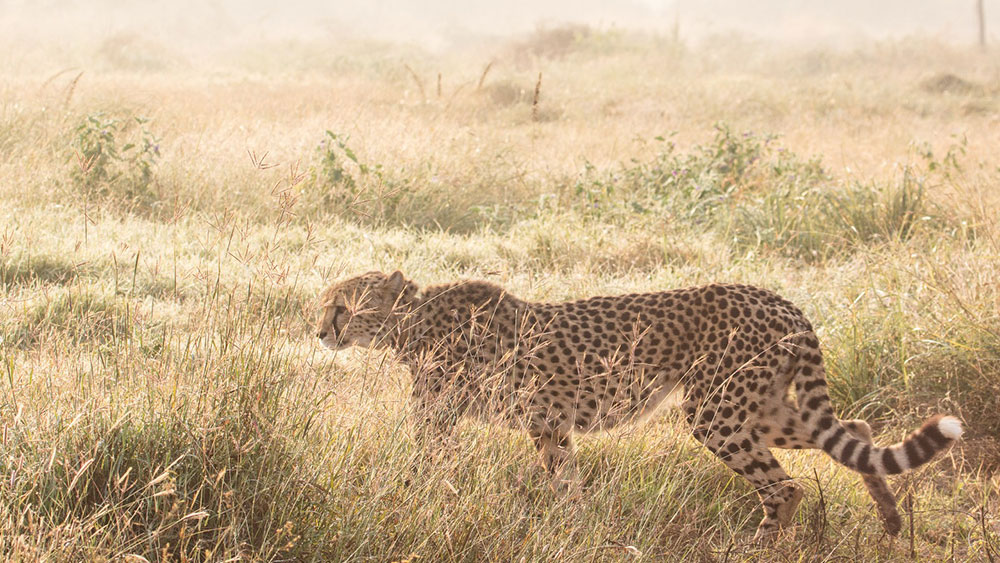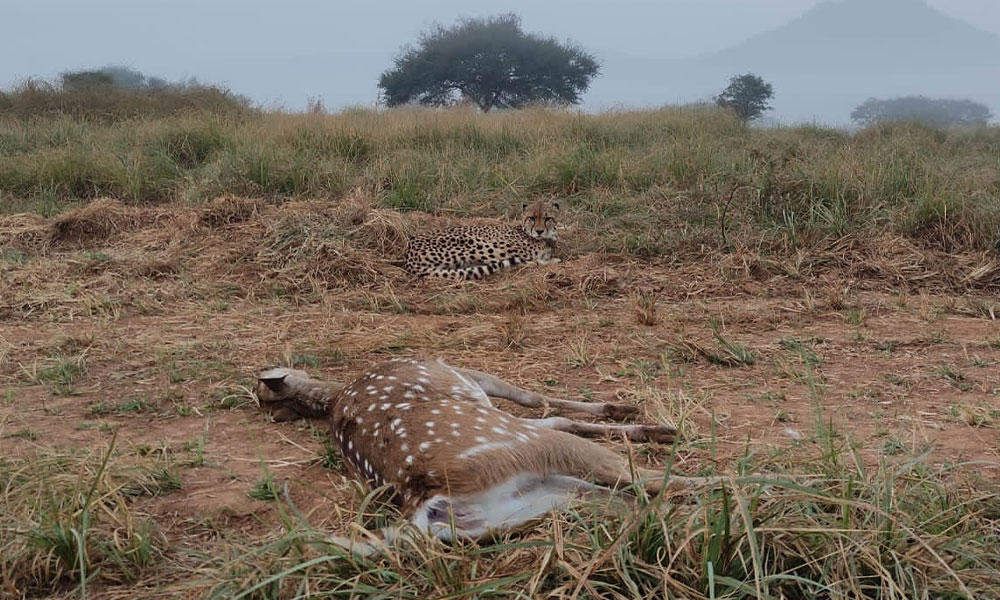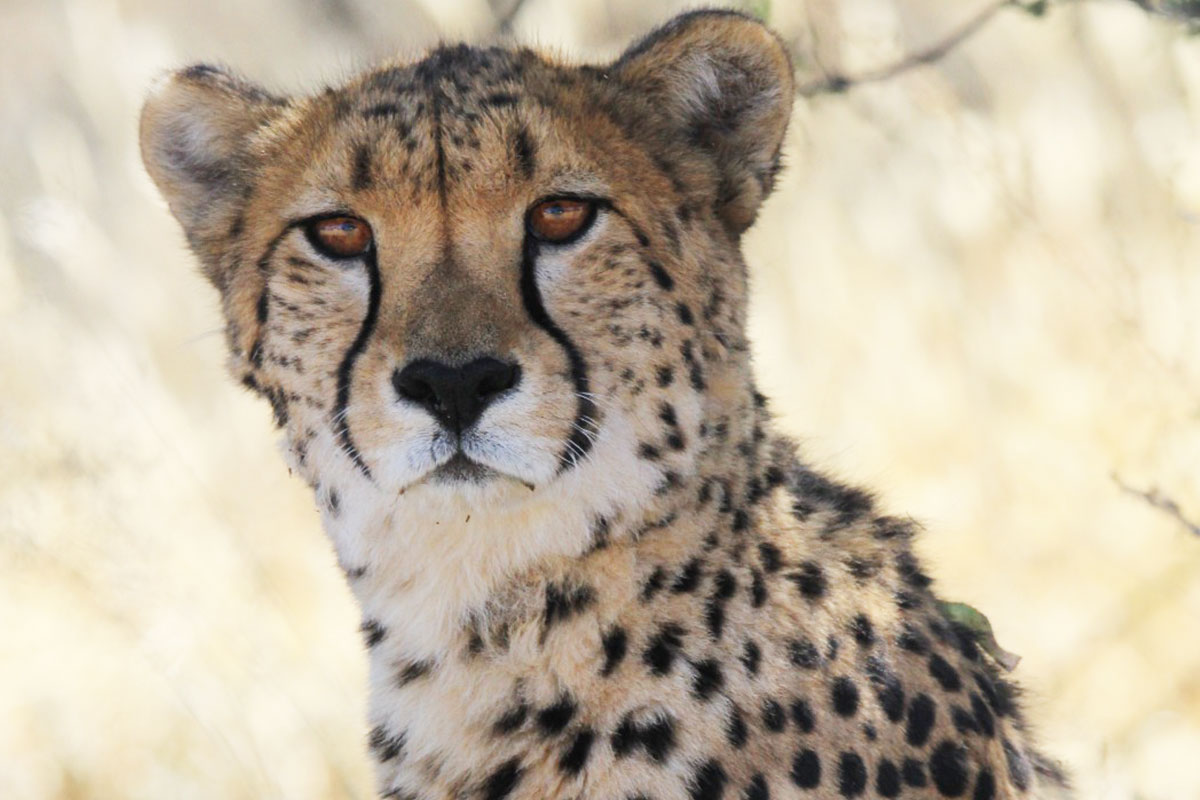Eulogy for Sasha
-

- by CCF Project Cheetah Team March 28, 2023

It is with a heavy heart that we share the news that Sasha, a 5.5-year-old female cheetah that was translocated to India, passed away on 27 March 2023. Sasha was one of the eight Namibian cheetahs selected for reintroduction into India’s Kuno National Park on 17 September 2022 to re-establish a wild cheetah population in India.
It is suspected that Sasha died of renal failure. While Sasha was being monitored by the Project Cheetah team and under the care of veterinarians, her death came as a surprise. The day before she died, she was reported as being alert and active. This had led to questions about her health history.
In general, Sasha did not show clinical signs of any disease while she was in Namibia. She was therefore considered to be a good candidate for translocation to India and release into the wild as part of the reintroduction programme. All results for her health examinations in Namibia were shared with the international team involved in the Indian reintroduction, as well as the Namibian and Indian authorities.
While Sasha’s kidney values were slightly elevated (410 µmol/L, which is slightly above the upper limit of 376 µmol/L), she showed no clinical signs, had no sign of infection, and her ultrasound showed no abnormalities, therefore this was attributed to her being slightly dehydrated at the time of the examination. Blood becomes more concentrated from dehydration so values become more concentrated, but these values reduce with sufficient hydration.
The selection process for all the cheetahs sent to India included several criteria: all cheetahs were wild born, clinically healthy and in prime age (2.5 to 6 years old). The genetics of the animals were also considered, as we were selecting the best candidates to be founder stock for the new population. All candidates underwent thorough health examinations, which included physical examination/observation, blood draws and ultrasound. Ultrasound was used to evaluate all the organs, and no abnormalities were found, including the kidneys, which had normal size and morphology/appearance (normal shape and density and structure). The digestive tract looked good as well.
Physical observations did not show any issues: all cheetahs had a good physical condition, good appetite, no sign of vomiting or diarrhoea, or undigested meat (which are commonly seen in cheetahs with gastritis).
On arrival in India, Sasha did very well. She settled in without any health issues being noted or reported. Showed a consistently good appetite and hunted successfully as soon as she got released into the camp with wild antelopes in December, requiring only one supplemental feeding after making her first kill.
In January, Sasha started to show symptoms and her health deteriorated quickly. Blood analyses showed kidney failure (creatinine of 761 µmol/L (8.61 mg/dL), which deteriorated to over 1000 within three days, which is a very fast progression and not consistent with chronic kidney failure, which is a common old-cheetah disease that our team is very familiar with and has a lot of experience providing care for) and haemolytic anaemia. She also developed gastritis (vomiting, diarrhoea, lack of appetite, undigested meat in faeces), which is a common pathology in cheetahs that are subjected to highly stressful situations.
The Indian veterinary team worked tirelessly to help Sasha, and the CCF veterinary team was on call for 24/7, assistance. As an infectious cause was suspected, Sasha was put on antibiotics, and after several weeks of treatment showed an improvement in her anaemia as well as her demeanour: she started eating again and was let back out into a two-hectare enclosure. This was a promising development as haemoglobin (a by-product of haemolytic anaemia) is harmful to kidneys, so the hope was that the kidneys would recover as well. However, it seems that her kidneys were not able to recover from the acute kidney failure, and Sasha passed away on the 27th of March 2023.
A necropsy was performed. Results of the necropsy itself as well as histopathology results may shed more light on the cause underlying Sasha’s rapid kidney deterioration.
While this outcome of an individual cheetah is very sad, the overall reintroduction so far has proven to be a major success, with four cheetahs currently out in the wild of the park, and three cheetahs awaiting release.

CCF will always remember Sasha for her role in helping establish a new wild cheetah population in India. Before she died, Sasha was adapting to India well, hunting on her own and enjoying the new environment. Her life had an important conservation purpose, and for this, she will forever be considered a significant individual.
Project Cheetah will continue. While we do understand and accept there will be losses associated with introducing these cheetahs, we also look forward to celebrating the first Indian cubs born to a Namibian cheetah very soon.
Related Reading
-
September 2, 2025
A New Way to Follow the Fastest Cat on Earth -
September 27, 2024
Representing the Cheetah at the AZA Conference





